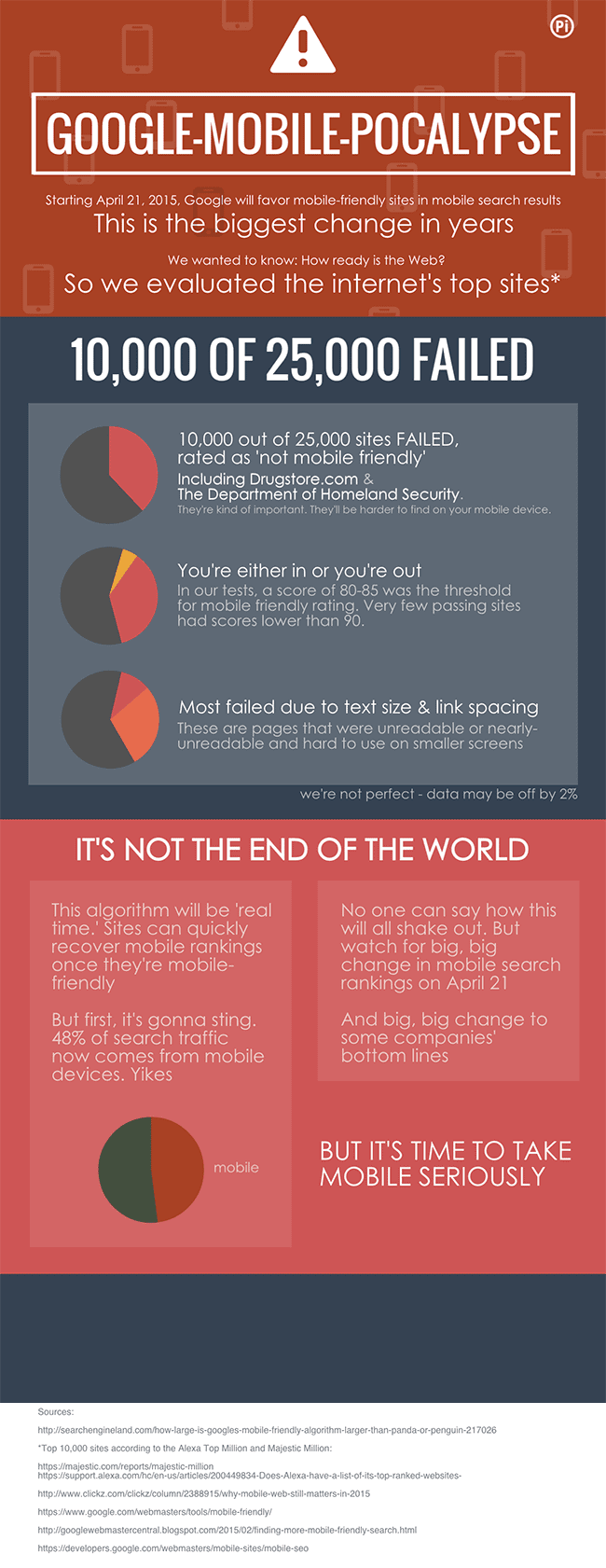The 411 on Mobilegeddon

What is Mobilegeddon?
This newest algorithm has been officially dubbed: Mobilegeddon.
But this is actually nothing new. It is, in fact, old news. Back in late February, Google had already announced that they were planning on introducing new algorithms for the way that mobile rankings were compiled.
The fact that there is commotion going on right now alludes to the connotation of procrastination, and nothing more.
In that February announcement, Google specifically outlined two points:
1.) There will be more mobile-friendly websites in the search results come April 21st. And that it will affect all mobile websites worldwide, significantly, so that the most relevant and user-friendly websites are being indexed on mobile platforms for users.
2.) More relevant app content will be included in search results. All this meant was that indexed apps, in particular the ones that users had already installed to their devices, would gain favoritism in the search results, from that device, when a query was initiated.
It All Started Last November
But again, this is not really anything new. You see, Mobilegeddon actually began way back in November. In a mid-November announcement, Google unveiled the “mobile-friendly” label, which let users who were conducting searches from mobile handsets know that the site they were visiting was either optimized for a more pleasant experience, or not, merely by the added and distinguishable mobile-friendly badging that would be omnipresent adjacent to the listing.
Google defined the mobile-friendly criteria, which has not changed since, as mobile websites that adhered to the following laundry list:
- Avoids software that is not common on mobile devices, like Flash.
- Uses text that is readable without zooming.
- Sizes content to the screen so users don’t have to scroll horizontally or zoom.
- Places links far enough apart so that the correct one can be easily tapped.
Google also gave webmasters advice that was clear-cut on how they could get their website to be rated as mobile-friendly, so they could enjoy the added benefits of badging (and to be spared from the impending Mobilegeddon that was looming on the SEO horizon).
Sites that wanted to conform to Google’s new mobile-friendly ranking method could gain assistance by utilizing the following Google suggested resources:
- Check your pages with Google’s Mobile-Friendly Test.
- Read Google’s updated documentation on the Webmaster’s Mobile Guide on how to create and improve your mobile site.
- See the Mobile Usability Report in Google Webmaster Tools, which highlights major mobile usability issues across your entire site, not just one page.
- View the How-To Guide for Third-Party Software (like WordPress or Joomla) in order to migrate your website hosted on a CMS (Content Management System) to use a mobile-friendly template.
Mobilegeddon is in Effect
Fast-forward back to the present day, and Mobilegeddon is in full effect. The mobile-friendly label is no longer just an added badge that assures users that your site meets these user-friendly mobile requirements; it’s a sordid, prevalent acumen of Google’s imbedded ranking algorithm.
What this means, prospectively, is that websites that are not mobile-friendly may lose their ranking position to websites that are mobile-friendly. Some may be de-ranked from the mobile search results altogether.
What You Can Do About It
If your website is not yet rated as being mobile-friendly, there are a few simple steps that you can take.
- Run the Mobile-Friendly Test on your website to assure it meets Google’s standards.
- Run the Mobility Usage Report to find any usability issues so you can correct them.
- Use the Developer Guide to get more information and to find out about other things that you can do.
Most Websites Aren’t Mobile-Friendly
If you think that it is just smaller ecommerce businesses like yours that are going to be affected by this Mobilegeddon algorithm, think again. A recent Portent report that tested the top 25,000 websites, as rated by Alexa, found that 10,000 of them outright failed. And these are the largest websites in the world. That’s 40% of the top web enterprises that are simply unprepared for Mobilegeddon.
So you are, indeed, not alone.
Also, insiders at Google (as well as leading SEO experts), have all consistently explained that high quality content is still the very backbone and key to effective SEO. Meaning that websites that have amazing content, but that are not mobile-friendly, will still, typically, outrank those that are; in spite of any mobile search statistics.
Ecommerce Will Be Affected the Most
If you think that it is just smaller ecommerce businesses like yours that are going to be affected by this Mobilegeddon algorithm, think again. A recent Portent report that tested the top 25,000 websites, as rated by Alexa, found that 10,000 of them outright failed. And these are the largest websites in the world. That’s 40% of the top web enterprises that are simply unprepared for Mobilegeddon.
So you are, indeed, not alone.
Also, insiders at Google (as well as leading SEO experts), have all consistently explained that high quality content is still the very backbone and key to effective SEO. Meaning that websites that have amazing content, but that are not mobile-friendly, will still, typically, outrank those that are; in spite of any mobile search statistics.
The thing is that ecommerce websites typically don’t have a lot of content. Many e-retailers don’t even use unique content, choosing the easier, faster route of copying and pasting manufacturer descriptions of products. If your ecommerce store does not have a lot of unique content and is not mobile-friendly, but relies upon mobile traffic for sales, take action swiftly or you will assuredly be penalized and de-ranked.
In the end, Mobilegeddon is an interesting way to make the user experience more palpable for mobile users. But, when all is said and done, it could also be much ado about nothing. Make sure you are prepared by using the tips that were offered here. Learn more about Mobilegeddon with this infographic below.

Share On:







